How to Stop a Golden Retriever Biting? (Updated Guide 2024)
Many dog owners struggle to respond to biting. Larger dogs, such as Golden Retrievers, can hurt their owners, children, and other dogs when they bite.
Luckily, Golden Retriever biting can be resolved.
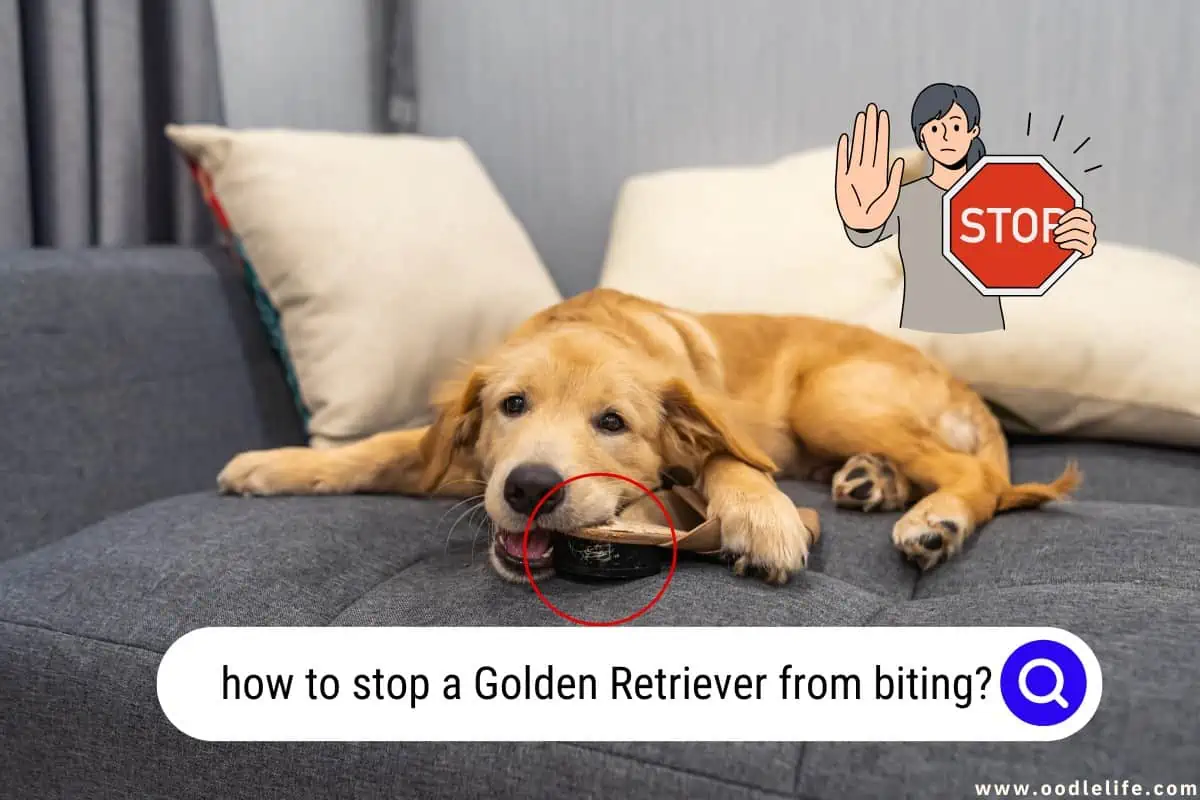
Below, you will learn the reasons behind biting and several techniques for responding to this behavior.
Understanding Why Golden Retrievers Bite
Before you can train your Golden Retriever not to bite, you must understand why he does so. Puppy and adult Golden Retrievers bite for different reasons, and we will explore both.

Reasons Why Puppies Bite
Biting serves three purposes for puppies:
- Ease teething pain
- Playing with humans or other animals
- Exploring their world
Golden Retrievers typically begin teething around three weeks old, when their puppy teeth push through their gums. Then, at about 12 weeks of age, his puppy teeth will fall out while adult teeth poke through. He will bite and chew most while his adult teeth emerge.
While Golden Retrievers wait for their adult teeth to fully poke through the gums, they experience pain and an itching sensation. Biting objects or human hands relieves the pain momentarily.
Puppies, and even some older dogs, also nip at each other while playing. Most dogs find this acceptable, but puppies must learn their limits. When young, it is nearly impossible for them to bite hard enough to hurt another dog.
As they get stronger and their adult teeth come in, however, they can hurt each other. When a Golden Retriever puppy bites another dog too hard, the dog will stop playing. Thus, the puppy will learn to be more careful while playing.
Like human babies, puppies are also curious about their world. Everything is new and exciting, and they try to gather as much information as possible. Often, biting an object can give the puppy important information.
He will learn about its texture and taste.
Biting some objects will cause humans to scold the puppy, while others do not elicit the same reaction. Remember that your puppy does not know which objects are chew toys and which are not until you teach him.
Reasons Why Adults Bite
Most adult Golden Retrievers bite for one of the following reasons:
- To get what they want
- Because they are stressed or bored
- Because of a habit
If you or your Golden Retriever’s previous owner did not train the dog properly, he might continue to bite into adulthood. Golden Retrievers are smart and will notice if they get their way after biting. Dogs who know they can bite without negative consequences will continue to do so.
Other adult dogs bite due to stress or boredom. Stressed dogs may lash out because they are too overwhelmed to react appropriately. Moreover, dogs with a history of abusive owners may bite to defend themselves.
Golden Retrievers like to be physically and mentally active. If kept in the house with nothing to do, they may bite due to frustration.
Occasionally, adult dogs struggle to outgrow the habit of biting. If the dog is four months old or older and still biting, he probably formed a habit.
Genetics
Golden Retriever biting partially stems from genetics.
Thus, Golden Retrievers have strong jaws and a tendency to rely on their mouths when exploring or playing.
What To Do About Golden Retriever Biting?
You can use several methods to stop your Golden Retriever from biting. While some dogs may need just one type of intervention, others may require multiple. Remember that every dog is different, and some methods may be ineffective based on the reason behind biting.
Training
Training should be your first choice if your Golden Retriever puppy is chewing furniture, your fingers, shoes, and anything else in sight. Puppies are much easier to train than adults, so early learning is crucial.
Ideally, you should begin training your puppy before he is teething. Teaching basic commands such as sit, stay, come, and down can simplify future training.
Whether your Golden Retriever is a puppy or an adult, effective training techniques should help stop Golden Retriever biting.
First, your demands should be firm and consistent. Just like children, puppies struggle to learn right from wrong when the rules are unclear. You must stop your dog from chewing inappropriate objects every time you see him do so.
This method will help your dog to learn more quickly.
Positive reinforcement is far more effective than punishment. Although many dog owners believe in harsh consequences, these reactions can lead to fear, avoidance, and aggression rather than learning. When your puppy chews a teething toy, shower him with praise and give him a treat.
These actions will motivate him to continue behaving appropriately.
Methods of Training
Distraction techniques work wonders for puppies because of their short attention spans. When your puppy is chewing furniture or shoes, switch his focus to a teething toy. You can do so by squeaking a chew toy or playing with it yourself.
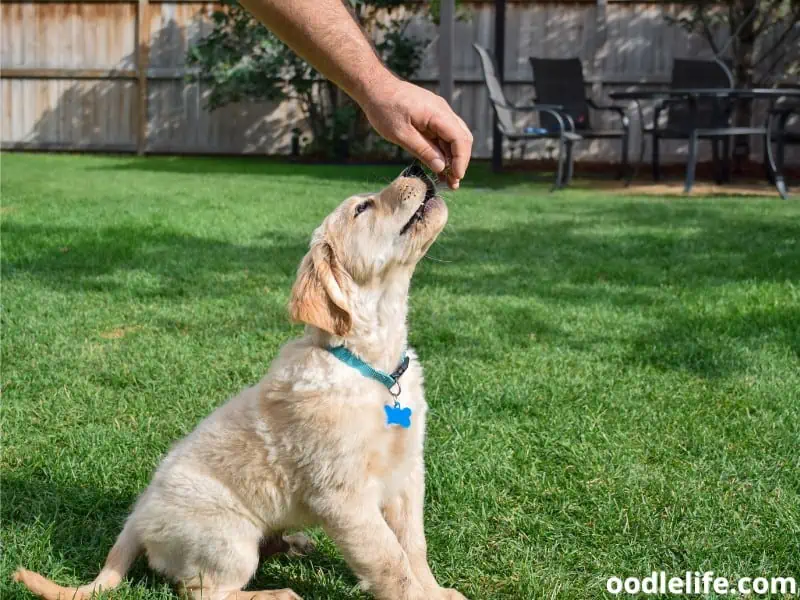
Then, praise your puppy for biting a chew toy and give him a treat.
Bite control can be a tricky concept for Golden Retriever puppies. Many will learn by playing with other dogs. When they bite too hard, the other dog will stop playing, and the puppy will learn to control his biting.
However, owners can play a role in this learning process as well.
When your puppy bites you during playtime, say “Ow!” in a raised voice. This noise signifies to your puppy that he hurt you. If necessary, stop playing with your puppy for a couple of minutes.
When he has calmed down, you can continue playing.
Training Example
There are many methods for training Golden Retrievers, and this example shows just one way you might use several techniques to train your dog.
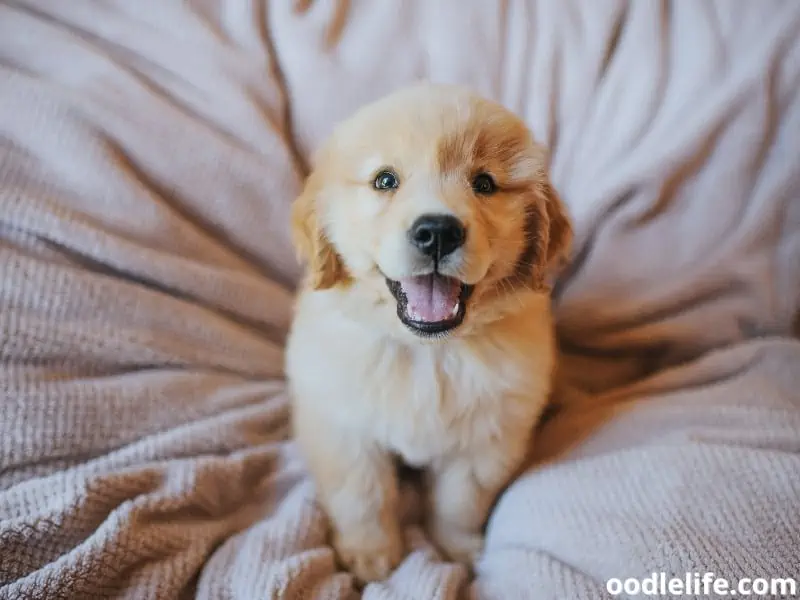
Let’s say that your Golden Retriever puppy bit your hand during playtime. Say, “Ow!” but do not pull your hand away. When he stops biting, state a simple command such as sit.
Praise your puppy for sitting and give him a chew toy.
Resume playtime. If your puppy bites again, stop playing and do not give him any attention. Once he has calmed down, continue to play.
Praise him for playing appropriately as often as possible.
These methods will teach your puppy bite control and show him that playing gently is more fun than biting.
Exercise
Golden Retriever puppies should receive physical and mental exercise daily. If he is alone in the house, provide plenty of toys or raw bones. These objects will keep him busy and give him an outlet when he needs to chew.
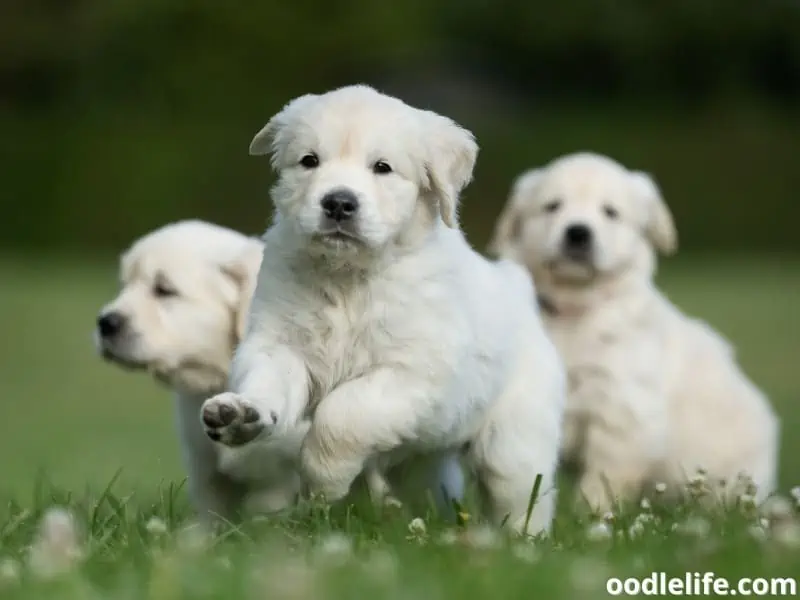
Remember to find the appropriate bone size for your dog.
Your Golden Retriever will also love to exercise with you. Daily walks are the perfect way to release your Golden Retriever’s energy and bond with him. Tug-of-war allows your dog to expend lots of energy in very little time, leaving him less energy to chew.
Fetch and hide and seek are great options for exercising your dog’s brain. Hiding treats across the yard for him to find will keep his mind busy and wear him out while he runs and searches for them.
The more tired your dog is, the less likely he will be to chew.
For more information on the exercise needs of your Golden Retriever, check out this guide.
Professional Intervention
Golden Retriever biting caused by stress or illness should be handled by professionals. Training a dog who is anxious or in pain can be counterproductive and frustrating for you and your dog.
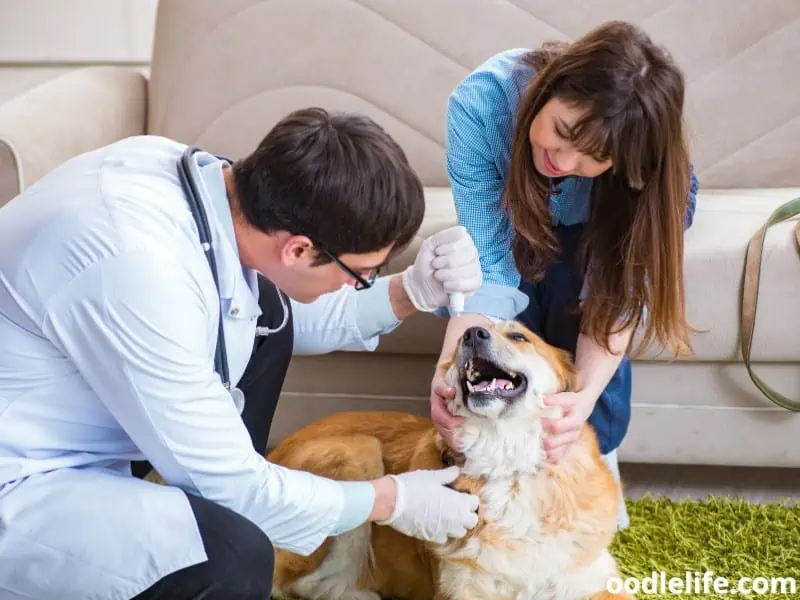
If your Golden Retriever chews when left home alone, he may have separation anxiety. Other dogs are more likely to chew when noise overwhelms them, such as during fireworks displays. Veterinarians can help you choose a treatment for your dog’s anxiety, and effective treatment is likely to reduce his biting.
Dogs who have been abused may benefit from training with a qualified behaviorist or professional trainer.
Likewise, consult a veterinarian if you believe your dog is sick or hurt. Treating this underlying condition should help eliminate biting.
Wrap Up
Once you understand why your Golden Retriever bites, you can respond effectively. If your Golden Retriever puppy is teething, he may need some training and chew toys. Adult dogs may need more exercise or a visit to the vet.
Regardless of the method, remember that your dog wants to please you. When you praise him for behaving appropriately, he will strive to do so again. Golden Retrievers are intelligent and eager to please, and they will respond well to consistent, positive training.